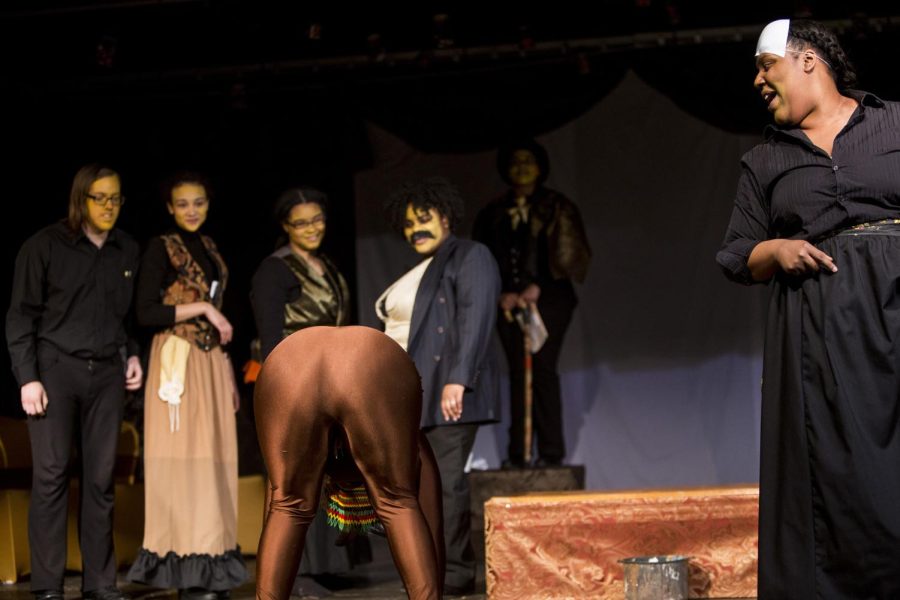Latest Pan-African Theatre Ensemble production confronts body image
The cast of “Venus” circles around Sarah Baartman, played by Maya Nicholson, a theatre studies major, during dress rehearsal Tuesday, March 14, 2017. “Venus” is based on the true story of Sarah, who was kidnapped by her Khoikhoi people in Africa in 1810. She was paraded around in freak shows and was given the stage name “The Hottentot Venus.”
March 15, 2017
The curtains open and the lights shine to reveal a stage filled with actors and actresses facing the auditorium. An actress stands in the middle of the small ensemble, wearing nothing but a nude singlet decorated with flowers.
One by one they begin to repeat lines over and over again to form a rhythm with their words. “She will outlive us all,” cuts through the chaos, echoing through an empty auditorium.
It’s a dress rehearsal for the Pan-African Theatre Ensemble’s latest production, “Venus,” which opens Friday.
“We thought ‘Venus’ would be a good play to do because it touches on a Pan-African issue broadly,” said D. Amy-Rose Forbes-Erickson, director of the play and assistant professor of Pan-African studies. “It covers global issues like sex trafficking and trans-Atlantic slavery.”
The Pan-African Theatre Ensemble is a non-profit, voluntary theatre company that works to promote black theater.
“The African-American community has a rich history of theatre. We honor that tradition,” Forbes-Erickson said. “We really want this department and this theatre to be the hub of black theatre in this part of Ohio.”
“Venus” follows the life of Sarah Baartman, an African woman who was kidnapped in 1810 and forced to work in a freak show because of her large posterior, which was considered abnormal at the time.
“Without her, we wouldn’t understand where the embellishments on the African-American woman’s body began,” said Maya Nicholson, a senior at Kent State and the actress who portrays Baartman. “She was the pinnacle, she was the start of it being public. We still see crumbs of that today.”
Baartman was forced to become the stage persona “The Venus Hottentot,” and perform for audiences that came from all over to examine her body. This still exists today in media, the most notable example — one that even the play acknowledges — is rapper Nicki Minaj.
“It’s something that we’re constantly living,” said Darryl Lewis, the production’s musical director. “Even though this took place in the 1800s, we can make comparisons to 2017. It asks the question: If we learn from our mistakes and we’re educated people, why are we still having the same conversation?”
European crowds were so amazed by her appearance that a cast molding of her body was made and her skeleton was put on display at a museum.
“What we’ve tried to do is focus on the issue of black women and black women’s bodies,” Forbes-Erickson said. “The audience might come away remembering some of the images that we have in the play and also tie them into things they see today. Some people might be a little offended by the images (and) some might actually start to think about it really seriously.”
The production is the third and final play of the Pan-African Theatre Ensemble’s season. “Venus,” written by Suzan-Lori Parks, was first performed in 1996.
“We want people to think more deeply about these issues,” Forbes-Erickson said. “We want for women to feel empowered in their bodies and to remove whatever shame is associated with bodies.”
The lights dim as the actors and actresses that make up the ensemble repeat the same lines they opened with, Baartman in the middle wearing the same thing she did in the beginning.
“She will outlive us all,” still cuts through the chaos. The curtains close.
Alex Kamczyz is the arts reporter, contact him at [email protected]












